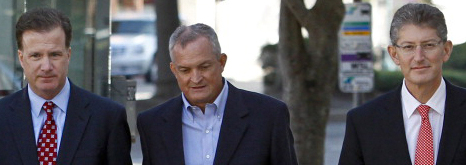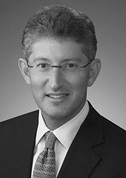© 2015 The Texas Lawbook.
By Mark Curriden
HOUSTON (Feb. 29) – When the New Orleans federal jury last Thursday found former BP Macondo site leader Robert Kaluza not guilty of illegal conduct in the Deepwater Horizon explosion in 2010, it ended an intense legal battle that spanned six years and cost millions and millions of dollars.
The U.S. Department of Justice, in an effort to establish a new precedent in the prosecution of individuals in environmental crimes, charged Kaluza with 22 counts of manslaughter and one count of water pollution. Attorney General Eric Holder even traveled to New Orleans to announce the indictments himself.

In an exclusive interview Sunday with The Texas Lawbook, Kaluza focused entirely on praising his attorneys – Houston trial lawyers David Gerger and Shaun Clarke.
“They were superb,” Kaluza said. “Thanks to them, the truth finally won out, and I have my name back.”
Lawyers following the BP prosecutions agree that the Kaluza case will go down in legal history for the way Gerger and Clarke systematically dismantled the federal government’s case.
“This is one of the greatest legal victories against the U.S. government of the past decade,” said former prosecutor Robert Hinton of Dallas. “The amazing work David and Shaun did in this case is the model for lawyers to follow in high-profile and complex prosecutions in the future.
“The techniques, strategies, work ethic and skills demonstrated by David and Shaun in this case should be taught in law school and in CLE programs across the country,” said Hinton, who is an expert on legal ethics.
Prominent Houston trial lawyer Rusty Hardin said Monday that Gerger and Clarke demonstrated “extreme courage” in convincing their client to keep fighting. He said the two lawyers “combined perseverance with amazing legal work” to win on all counts.
But legal experts say the case also showcases the need for lawyers to stand up against the federal government when prosecutors over-reach in high-profile cases.
“All too often, defense counsel are not willing to stand up to the power of the federal government,” said Michael Goldberg, a partner in the white-collar criminal law section at Baker Botts in Houston. “Some lawyers push hard but are only trying to extract a face-saving settlement.”
Goldberg and others said the heroic defense by Gerger and Clarke shows other lawyers and clients that fighting against the federal government can be successful.
The pair and their legal teams spent more than 8,000 hours working on the case. They converted guest rooms on the 21st floor of the Loews Hotel in downtown New Orleans into office space. In the courtroom, the lawyers used an old-fashioned history lesson about a 164-year-old law and innovative yet potentially risky legal strategies to win the case.
Then there was the mountain of evidence to review.
“We knew there would be a lot of documents, but we never dreamed there would be more than 90 million pages of documents,” Gerger said in an exclusive interview with The Texas Lawbook.

Clarke and Gerger were hired to represent Kaluza just days after the Deepwater Horizon exploded on April 20, 2010. Eleven platform workers were killed. Seventeen others were seriously injured. The lawyers said they knew that they had to deal with evidence and the public emotion and outrage over the explosion and oil spill.
“I remember Matt Lauer asking President Obama when he was going to kick some ass and the president responded that he was just trying to figure out whose ass to kick,” Clarke said. “Unfortunately, they focused on our client.”
BP hired Clarke and Gerger to represent Kaluza because they had successfully defended a company executive in an alleged illegal energy trading operation a few years earlier.
In addition, the pair had experience defending high-profile clients in complex criminal cases.
Gerger, who is a partner in the Houston office of Quinn Emanuel, represented former Enron Chief Financial Officer Andrew Fastow, Iranian-American businessman Khosrow Afghani released last month as part of the agreement signed by President Obama and Dallas socialite Erin Hill in the mortgage fraud case brought against her and her husband, Al Hill Jr.
Clarke, a partner at Smyser Kaplan & Veselka in Houston, is a former assistant U.S. Attorney who prosecuted several complex white-collar criminal cases. He represented former New York Yankee second baseman Chuck Knoblauch in the investigation by the U.S. Congress into the use of performance enhancing drugs. He also successfully defended Dallas-based Tenet Healthcare in a federal criminal investigation in the days after Hurricane Katrina.
Dane Ball, a partner at Smyser Kaplan, worked with Gerger and Clarke as a lawyer on the trial team. Other members of the team included David Isaak and Alex Wolf of Smyser Kaplan and Alex Hughes, Jon Liroff and Samy Khalil at Quinn Emanuel.
The lawyers said the legal team faced obstacles right away.
“We had to master the very technical field of offshore drilling but we couldn’t find experts in the field to work with us because BP, Transocean, Halliburton and others had already hired nearly all of them,” Gerger said. “Finally, after a lot of searching, we found experts who were excellent in helping us prepare our case.”
Gerger and Clarke employed cutting edge digital software that scanned and searched the 90 million documents for key words, including people’s names, specific dates and names of operations.
Among the documents they unearthed were a series of emails between two BP engineers that were written on April 17 – three days before the explosion.
“One BP engineer writes that it’s ‘insanity on the rig, and the other engineer writes back that, ‘the operation is not going to succeed if we keep going in this manner,’” Clarke said.
Gerger and Clarke agree there were three critical moments in the case.
The first came in 2013. Eleven of the 23 charges brought by the Justice Department against Kaluza were so-called “Seaman’s Manslaughter,” which prosecutors argued applied in this case because the victims were killed at sea.
But Gerger argued that the law, which was passed in 1852, applied to captains of steamboats – not workers on an oil-rig.
“We showed that the 1850 law specified captains and engineers who were dangerously racing up and down the Hudson River to carry the most passengers,” Gerger said. “Boat captains were crashing into each other and thousands of people died as a result.”
The federal courts agreed the law did not apply in the BP case and tossed the 11 charges.
The second big victory occurred last December. Three different sets of federal prosecutors leading the government’s case came and went. The final prosecution team reviewed the evidence and voluntarily dismissed the 11 remaining manslaughter counts against Kaluza.
“We met in Washington and the new prosecutors were willing to take a fresh look at the law and the evidence,” Gerger said. “They agreed to dismiss those counts.”
That left one remaining count of negligent water pollution under the Clean Water Act. If convicted, Kaluza could have received up to 11 months and 29 days in jail.
The federal judge allowed the lawyers to question the potential jurors about possible bias during jury selection.
The defense hired prominent Dallas jury expert Robert Hirschorn to help guide it through the jury selection process selection and to identify potentially bad apples.
“We were looking to strike people who had an axe to grind because of the spill,” Clarke said. “We ended up with a smart jury that had good common sense.”
For seven days, six women and six men listened to the testimony. One of the prosecution’s key witnesses was former BP rig supervisor Donald Vidrine, who agreed pretrial to plead guilty to a misdemeanor charge in return for his pledge to testify against Kaluza.
Defense lawyers usually cross-examine such witnesses vigorously to undermine their credibility and show them to be criminals to the jury.
Gerger, however, believed that Vidrine’s testimony would not hurt his client. So, the lawyer took the risky step of agreeing in open court to not impeach Vidrine’s testimony and not ask him about his decision to plead guilty. He asked that the government be prevented from doing so, too.
“We wanted to block the government from introducing Vidrine’s guilty plea to the jury because we worried that the jury would feel that if Vidrine admitted he was guilty, they might think our client should be guilty, too,” Gerger said. “We didn’t want guilt by association.”
The strategy worked. The judge ordered prosecutors to refrain from mentioning the witness’s conviction to jurors.
Vidrine ended up being an excellent witness for the defense, testifying repeatedly that he was convinced the well was safe and that Bob Kaluza acted properly under the circumstances.
In closing arguments, Clarke asked the jury to “put yourselves in the steel-toed boots” of Bob Kaluza on the day of the explosion. Everything Kaluza did was “eminently reasonable,” Clarke said.
“The real hero in this case is Bob Kaluza because the United States government threw everything it had at him for six years and he somehow found the courage to defend himself,” Gerger said.
© 2015 The Texas Lawbook. Content of The Texas Lawbook is controlled and protected by specific licensing agreements with our subscribers and under federal copyright laws. Any distribution of this content without the consent of The Texas Lawbook is prohibited.
If you see any inaccuracy in any article in The Texas Lawbook, please contact us. Our goal is content that is 100% true and accurate. Thank you.
